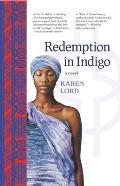
I've been asked about Barbadian culture and how it relates to African, European, and American cultures.
Redemption in Indigo was rejected by a publisher for not being 'Caribbean enough.' I discovered that a library in the US has chosen to catalogue
Redemption in Indigo as African-American fiction.
Those three things are connected. Let me start with a story.
Once upon a time I was in Scotland — Glasgow, to be precise — attending a Celtic Connections workshop, learning to sing Gaelic songs (no previous knowledge of Gaelic required). Among the participants was a couple dressed in some neo-Romantic, eighteenth-century Scottish fashion. He — dark-haired, ruddy-cheeked, kilted; she — pre-Raphaelite, ethereal, lacy. I was sure I'd already seen them at a ceilidh, similarly attired and dancing with great competence and charm.
Deep in concentration as I sang the unfamiliar sounds, I began to lean towards them discreetly, hoping to overhear the correct pronunciation of the lyrics. A faint shadow fell over my songsheet. I glanced up to discover that the Authentic Scotsman was... leaning towards me discreetly, trying to hear my pronunciation. We caught each other at it and began to laugh.
'I thought you spoke Gaelic,' I admitted.
'No, we don't,' he replied, 'and we thought you knew the song.'
I've learned since then to always take 'authenticity' with a grain of salt.
Is Redemption in Indigo an authentic Caribbean story? Could be. I live here. I've filled it with what seems like everyday life to me. Still, it's not set in the Caribbean, nor anywhere on Earth, for that matter. Is it an authentic African story? Harder to say. Was Leo Frobenius, the German ethnologist who recorded the story in the 1920s, a reliable chronicler? I haven't done sufficient research to answer that one way or another. The story was filtered through him and his worldview, and now it is filtered through me and mine.
The African folktale is at the core and the Caribbean influence is widespread, but there's more. The majority of the novel is fantasy. That's the fun of writing speculative fiction. You get to create entire worlds. The Caribbean is a good base for that. Africa, the Americas, Asia and Europe meet and mingle here. You can 'borrow' something from the culture and traditions of a friend or relative: fashion, cuisine, mythology, language, or music. You can't help but reveal much of your own creolised, blended culture and traditions.
Travelling builds on that base. My Glasgow experience was doubly rich because the city is Scottish and international and not afraid to mix and match (haggis and pasta at an Italian restaurant, Latin dance classes at a downtown pub). Oxford is literary heaven, English and global. There I found Frobenius's works with the original folktale at Rhodes House Library (sorry, the Bodleian Library of Commonwealth and African Studies at Rhodes House). I went to the Eagle and Child and raised a glass to Lewis and Tolkien.
I'm neither a literary critic nor an anthropologist, so I can't tell you what culture is authentically represented by my novel. Redemption in Indigo is authentically me. It is where my ancestors came from (might be three continents there), where I am now, where I've been, who I've made friends with, and what I've read. Accept no substitutes.